Ukraine War Not Worrying Ryanair as They Seek Zagreb Stewardesses
March the 5th, 2022 - With the war raging in Ukraine and companies no longer flying over Ukrainian or Russian airspace, things for the aviation industry are needing to be reworked once again following a terrible time with the coronavirus pandemic. Ryanair, which is currently on the hunt for Zagreb stewardesses however, isn't too worried.
As Poslovni Dnevnik/Darko Bicak writes, the global coronavirus pandemic and the restrictions it brought are slowly easing up, and the Russian-Ukrainian war should not significantly complicate air traffic in Europe, including for Croatia, Ryanair said.
They added that plans to base three of their aircraft in Zagreb and Zadar remain firmly in place, and the recruitment of cabin crew in Croatia, particularly Zagreb stewardesses, is underway. Tadej Notersberg, the Chief Operating Officer of Lauda Europe, a company that is part of Ryanair, spoke about the current situation and plans as we move forward:
"The coronavirus crisis has disrupted air traffic in Europe a lot, but with the lifting of restrictions in most countries, we're returning to our previous framework. We can’t say that the pandemic is something that is now firmly behind us because we're still living with it and adapting to the situation. Reservations for the summer look very good and we're optimistic. As our business year ends at the end of March, I still can't say exactly what last year's numbers of transported passengers are going to be, but they're certainly much higher than those from 2020, and it's also certain that we haven't yet reached the level of 2019. However, we have indications that this year could be at the level of 2019, if not better,'' said Notersberg, who is well acquainted with the Croatian market because he started his career in the neighbouring Slovenian Adria Airways.
He added that the war in Ukraine presents them with a certain challenge, but so far, it isn't even anywhere remotely close to what COVID-19 caused, and still is causing. Ryanair had no lines to Russia, and those to Ukraine (Zagreb-Lviv has recently been removed) are currently suspended until the situation there calms down.
"We're very satisfied with our business so far here in Croatia, and the forecasts speak of further growth. That's why we're now increasing our fleet and our number of flights and lines. Based on the results so far, we're working on strategies for the next period where Croatia will be an even more desirable destination with a much larger number of air passengers,'' said the director of Lauda, the only company within the Ryanair Group to fly Airbus while everyone else uses Boeing aircraft.
Due to the current and expected growth of air traffic in the Republic of Croatia, Ryanair has started (with a specialised employment company called Crewlink) the process of recruiting Zagreb stewardesses, as well as staff from Zadar. Notersberg pointed out that they plan to employ about 40 people for now, but that this is probably a process that will be constant because they will need additional staff in the future.
"We're very pleased with last week's response to our open day in Zagreb, and in the coming days we're going to have two events in Zadar and another one next week again in Zagreb. In addition, we've opened an info desk at the Franjo Tudjman Airport in Zagreb, which will work for at least 15 days, and where all passengers and curious people will be able to learn more about job opportunities in Ryanair and register and pass a preliminary interview,'' pointed out Nottersberg. This summer, Lauda Europe will operate six Airbus A320 aircraft based in Croatia.
“Over the next few years, the Ryanair Group and Lauda Europe will expand their capacities across Croatia, which will bring more traffic, new jobs and career benefits,'' said Notersberg, adding that Ryanair already has Croatian employees, especially among pilots, but this is a completely different model of selection and is not related to this process.
For more, check out our travel section.
Anica Djamic: Croatian Ambassador to Ukraine Who Refused to Leave
March the 5th, 2022 - Who exactly is Anica Djamic, the Croatian Ambassador to Ukraine who refused to leave the besieged capital of Kiev during the first week of the Russian invasion?
As Poslovni Dnevnik writes, Anica Djamic is one of the few Western diplomats who chose to remain in the Ukrainian capital for such a long time following the Russian attack and regularly reported on the tragic unfolding situation in the country, despite the fact that Kiev was under the constant threat of Russian rocket attacks.
Fifteen days ago, before the direct Russian invasion of Ukraine, there were about one hundred foreign ambassadors residing in the City of Kiev, but after the attack they began to leave and only a dozen of them remained, including Croatian Ambassador Anica Djamic.
Anica Djamic flatly refused to leave Kiev until all Croatian citizens in the capital of that time were safe, but on Monday, PM Andrej Plenkovic decided she had to leave the city and report on the invasion from a safer place. "Given the deteriorating security situation in Kiev and the attacks on the Ukrainian capital, I instructed our ambassador Anica Djamic to leave the city," Plenkovic told parliament, adding that she was, at that point, on her way to Lviv, where she would stay and continue to perform her duties, help Croatian citizens and monitor the ongoing situation in Ukraine.
The name of the Croatian Ambassador to Kiev became known to the public because of her courageous speech, her talks with Croatian citizens in Ukraine and her regular reporting from Kiev despite the extremely dangerous situation there.
Three days ago, for example, she appeared on HRT's show Dobro jutro, Hrvatska/Good morning, Croatia from a shelter. "It's the fourth night we've spent in the shelters. An alert was issued four times from last night to this morning. Since we receive warnings that there is a serious danger of attack, citizens are urged to stay in their homes, and when the sirens sound, they go down to the shelters. These shelters are very often ordinary basements, but it should be said that the city has opened up metro stations to be used as shelters, so entrance to the metro is free,'' said Ambassador Djamic for HRT.
"From last night until this morning, the alarm sounded four times. We heard the detonations. It has become an every day thing for us now. Of course, it's smarter to remain in the places in which we feel the most protected,'' she said.
At the end of the conversation, Anica Djamic said that she was in Ukraine and that her place was now there. "If there's a need to leave, then we'll look at the roads," concluded Djamic, who then said she did not want to leave Ukraine while there were Croatian citizens still in the country, reports Index.
Mesic: She was a good analyst
Not much was previously known about Ambassador Anica Djamic, but she is an experienced diplomat who worked in the Office of the President back in the mid-1990s, where she was an assistant foreign policy adviser. Prior to going to Ukraine, she was Ambassador to Sweden from 2014 to 2018. Since 2019, she has been the Ambassador to Ukraine.
From 2000 to 2005, former Croatian President Stjepan Mesic appointed her as an adviser on European integration. He said for the 24sata publication that she was one of the most conscientious advisers he'd ever had, adding that she was very educated and spoke multiple languages.
For more, check out our politics section.
Croatia’s Most Spectacular Vineyard: Sea, Stone and Sparkling Wine of Bakar Bay
March 4th, 2022 - For centuries, the steep slopes of Bakar bay have been covered in terraced vineyards built in dry stone. A look into the iconic sparkling wine Bakarska Vodica and the passionate local community that rekindled the tradition and saved the brand from oblivion
There’s a small town in the Northern Adriatic that once used to be three times as big as the capital. In terms of population, that is: at the turn of the 19th century, Bakar was the most populated town in Croatia.
A lot has changed since then, including the landscape of the once idyllic coastal town. In the 1970s, the Bakar bay was transformed into an industrial zone featuring a coke plant and a bulk cargo port, complete with an oil refinery in the nearby Urinj. The plant closed down in the late 90s, but it took a lot longer for the town tainted by decades of pollution to shake off the stigma and focus on brighter things ahead.
 Bakar / TMaras, Creative Commons
Bakar / TMaras, Creative Commons
Looking at the remnants of Bakar’s industrial past lining the bay, you would never think that the area used to be known for prolific wine production. And yet it was, and even though the centuries-long winemaking tradition was briefly interrupted, the area is now regaining its fame thanks to the herculean efforts of the local community.
The story of Bakar wine begins in the 18th century, when Empress Maria Theresa granted Bakar the status of a free town complete with all related privileges. The empress encouraged the wine trade, going so far as to exempt those who cultivated the land for the purpose of grape growing from paying taxes for a period of five years.
The local populace jumped on the opportunity and the steep Bakar coastline soon turned into one big vineyard, but the specific traits of this geographic area meant that people had to get creative.
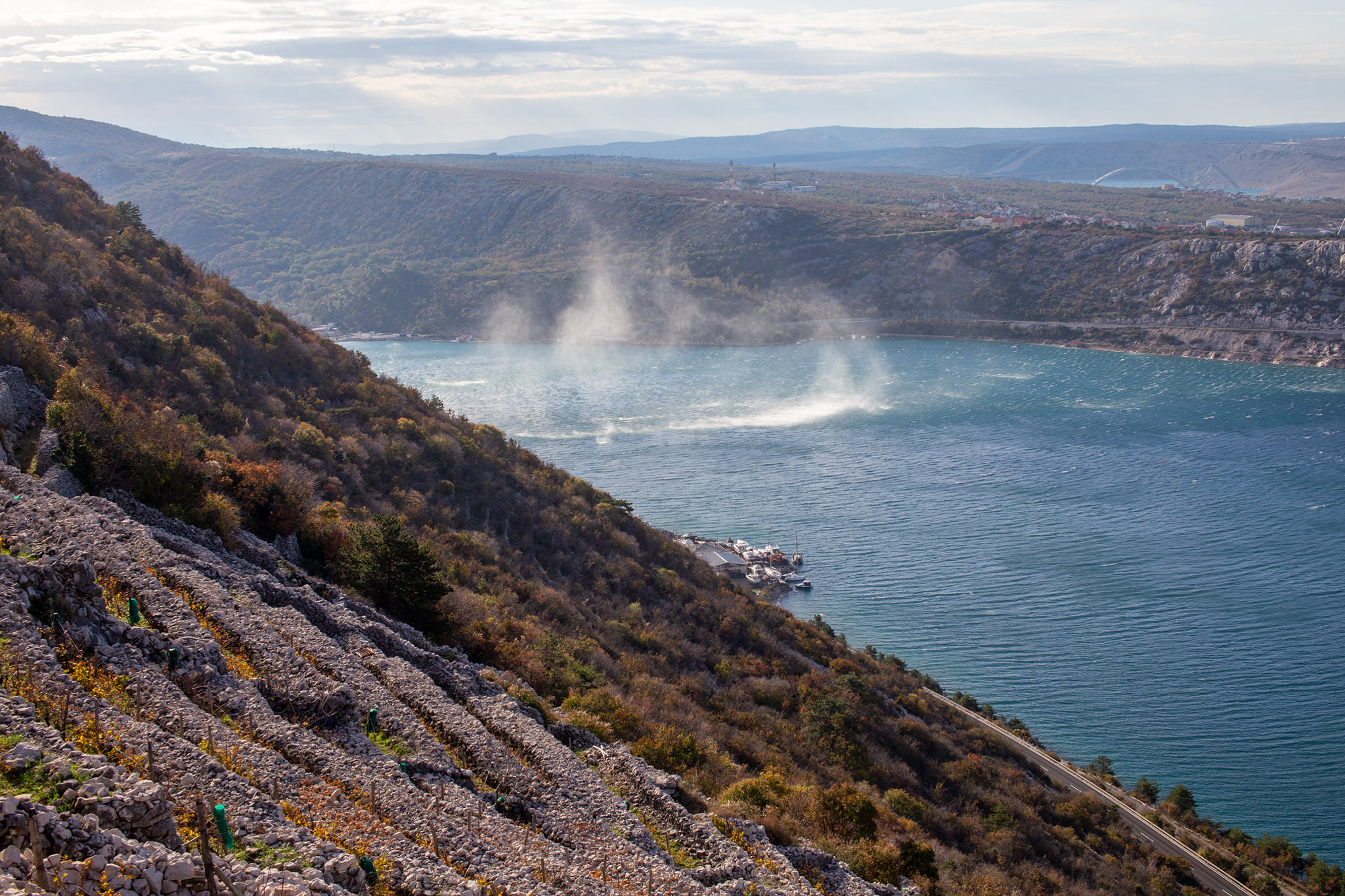 Praputnjak - kulturni krajolik Facebook
Praputnjak - kulturni krajolik Facebook
First of all, there’s bura. The mighty wind wreaks havoc in this part of the Adriatic to such a degree that it inspired a saying: bura is born in Senj, gets married in Bakar, and goes to Trieste to die. With a good part of the Bakar coastline fully exposed and facing the open sea, something had to be done to shield the grapevines from the wind’s destructive force.
There’s also the rugged karst terrain, not exactly the most favourable environment in terms of agriculture. The barren slopes had to be painstakingly cleared of stone and what little vegetation there was, followed by enrichment of the land with fertile soil brought over from the hinterland.
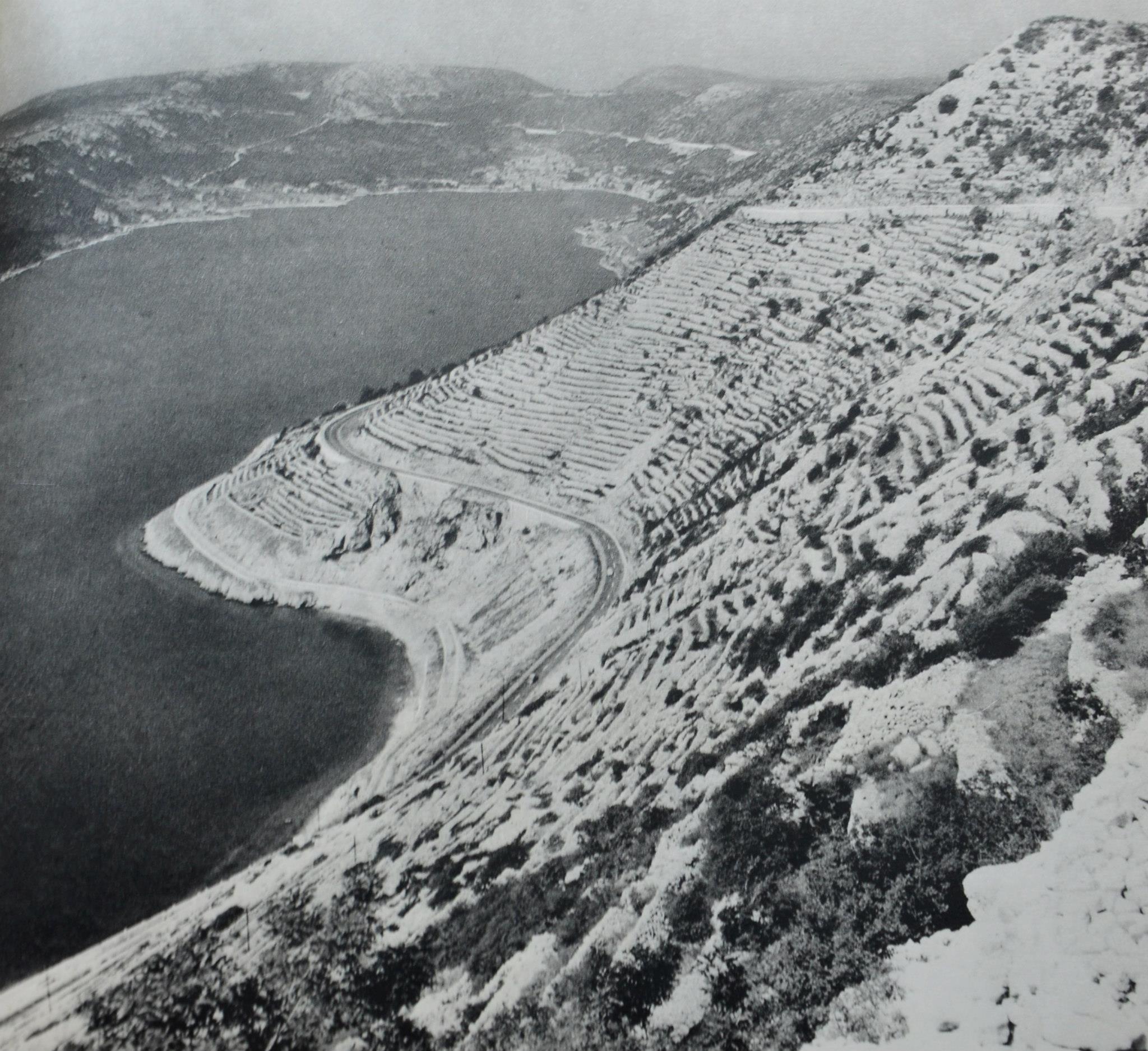
To ensure all of this stayed in place, the local population built dry stone walls, creating vast terraced vineyards that are known in Croatian as Bakarski prezidi. And while dry stone walling is a staple of traditional building in Croatia, rarely is it found in such a unique form: steep slopes criss-crossed with walls, running almost all the way down to the sea.
Given the challenging terrain, it took eight hours of work for one person to build 1,5 cubic metres of dry stone wall. Soil had to be brought over from the mountainous hinterland, either on foot or on carts, prolonging the construction process.
And yet, by the end of the 18th century, dry stone terraces covered 42 hectares of land on the Bakar coastline, entirely cultivated with grapevines. As seen from above, minus the grapes:
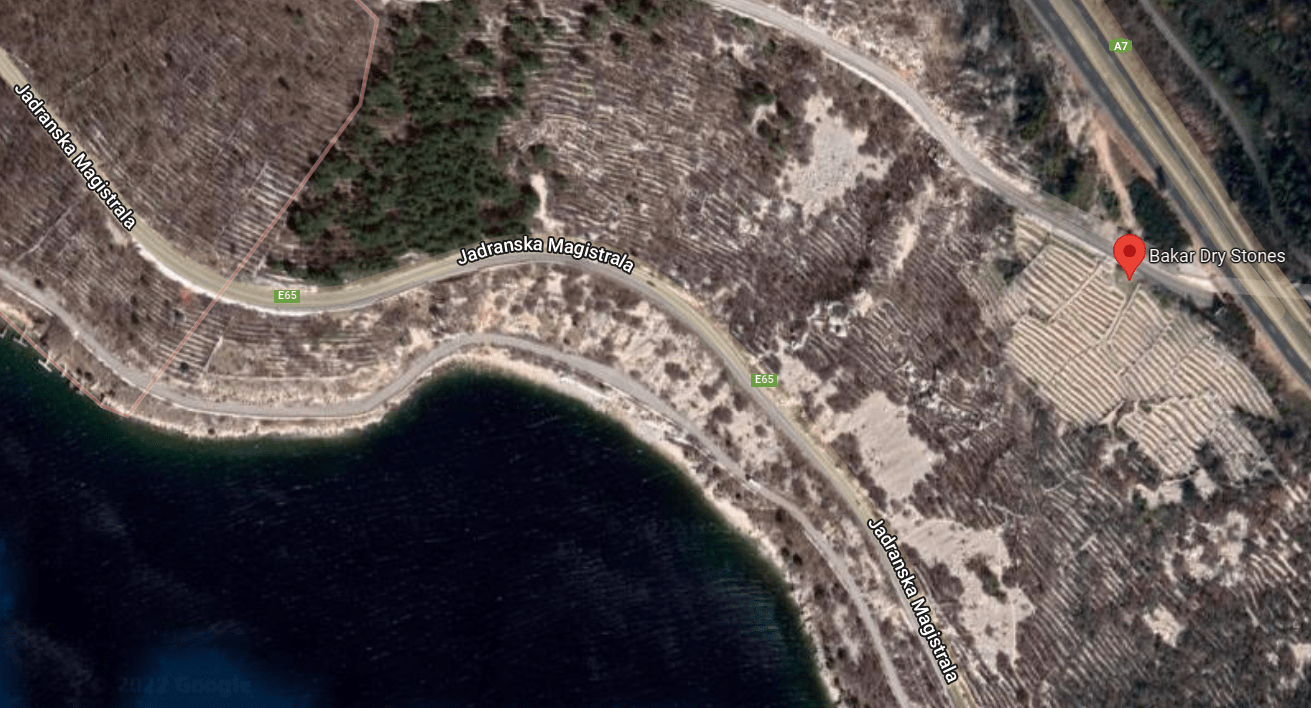 The dry stone walls of Bakar, with the most recently restored area seen on the right
The dry stone walls of Bakar, with the most recently restored area seen on the right
The local population, mostly that of the nearby village Praputnjak, grew the belina grape variety used to produce a renowned sparkling wine named Bakarska Vodica (Bakar Water).
It’s speculated that the methods of sparkling wine production were introduced in this region by French soldiers during the Napoleonic era, or perhaps by Bakar shipowners who at the time did business with France. Either way, it didn’t take long for winemaking to become one of the main sources of livelihood in the area. All the families in the region took part in the grape harvest, and the tricks of the trade were taught to children from an early age.
With most men employed at the local shipyards or out at sea for a good part of the year, women took on a lion’s share of the work and were proficient in every part of the wine trade, from cultivation to winemaking. Men typically took on the more physically strenuous tasks such as the construction and maintenance of the dry stone walls.
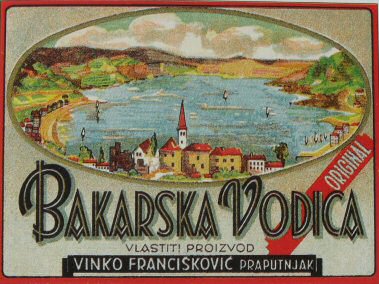 A vintage label design for Bakarska Vodica / Public domain
A vintage label design for Bakarska Vodica / Public domain
For centuries, Bakarska Vodica was produced in the Bakar region using the ancient method known as méthode rurale, which involves bottling the still-fermenting young wine so it would produce CO2 in the bottle without the need for a second fermentation process. It was made of indigenous white grape varieties, belina for the most part, as well as žumić, vrbić, verdić, žlahtina, gustošljen, brankovac and white muscat.
Bakarska vodica was historically held in high regard and was seen as a brand of the region. A wine law passed in 1930 reads:
The name Bakarska Vodica can only be used for natural sparkling wine produced in Bakar and its environs from grapes grown in the area and using the traditional method.
And:
Bakarska Vodica is a natural sparkling wine from the Croatian Littoral. The fermenting young wine (mošt) is bottled and stored in a cold environment.
Speaking of branding, the Bakar wine was talked about as early as 1910, with a state decree saying:
The name 'sparkling wine' is to be featured on bottle labels, printed in large and easily legible letters that draw attention. The label is to be affixed in such a way that it can only be removed from the bottle by being soaked in water.
Bakarska Vodica was not to be messed with. And so it went on until WWII, when production came to a halt for a number of reasons varying from grapevine diseases to legal regulations.
Its real fall from grace began in 1960, when the company Istravino adopted the name Bakarska Vodica for a low-quality sparkling wine made by carbonation and bastardised the poor historic brand. Over time, they reached an output of 2,5 million bottles a year, made possible by low manufacturing costs and partially outsourcing production to Slovenia. The faux Bakarska Vodica is still available on the market, nowadays produced by Mladina in continental Croatia.
This could have been the end of Bakarska Vodica, were it not for a passionate community of Praputnjak locals who decided to roll up their sleeves and reinstate one of the region’s most recognisable brands. In 2000, the Agricultural Cooperative Dolčina from Praputnjak (Poljoprivredna Zadruga Dolčina) launched an initiative to restore the old vineyards and save the belina variety from extinction.
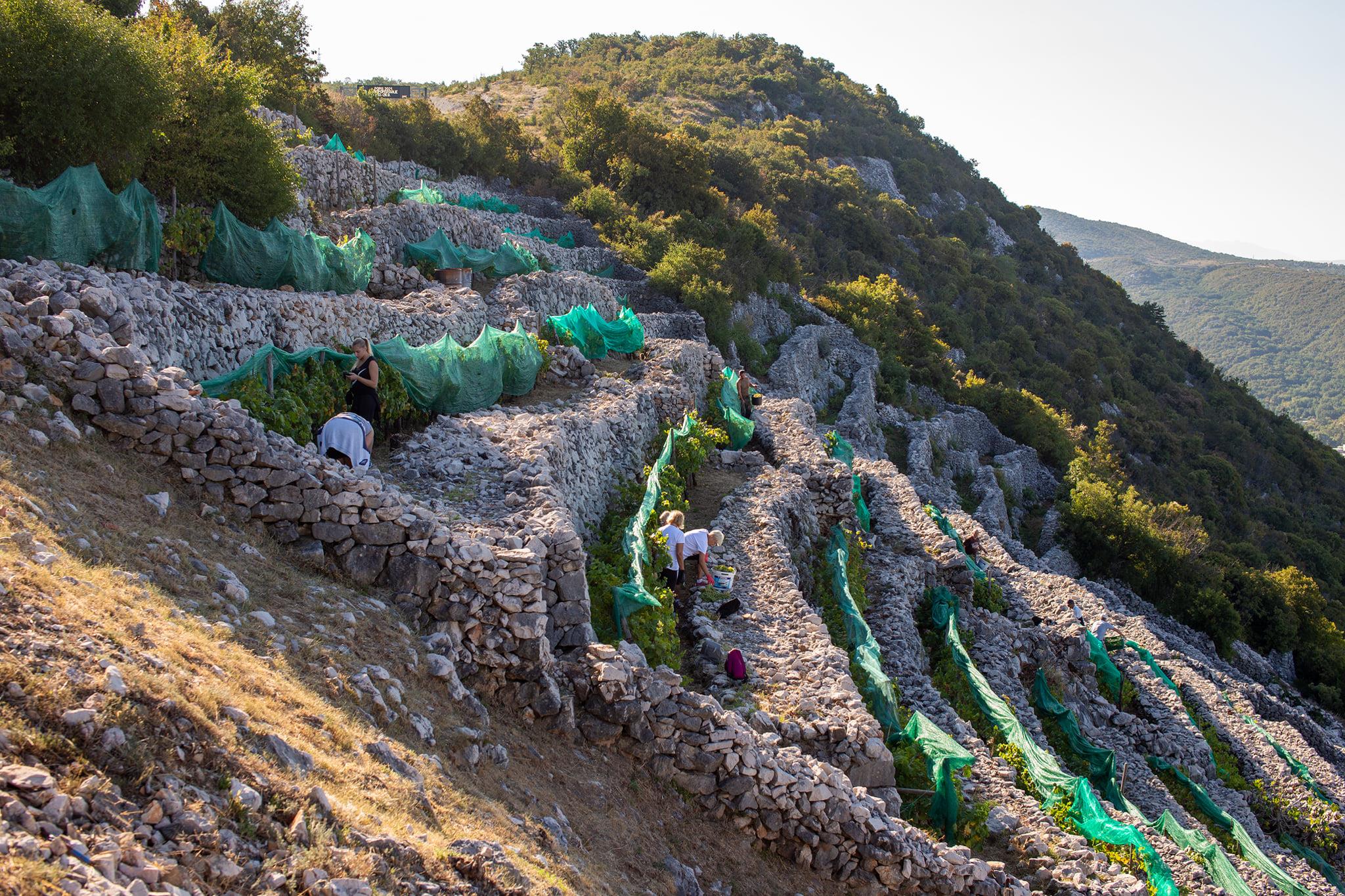 Praputnjak - kulturni krajolik Facebook
Praputnjak - kulturni krajolik Facebook
It made perfect sense to start at Takala, a location east of Bakar that the Ministry of Culture declared a protected cultural landscape (ethno zone) in 1972. Takala was historically cultivated by the people of Praputnjak, and the land plots are owned by the locals to this day. In the local dialect, the name Takala means ‘poured downhill’ - very appropriate in this context.
By 2002, eight dry stone terraces were restored, the land cleared after decades of neglect, and the first 280 belina seedlings ceremoniously planted before a delighted crowd. Little by little, the vineyard grew in size, soon yielding a large enough harvest for the famous bubbly to be reintroduced under the name of Stara Bakarska Vodica (Old Bakar Water).
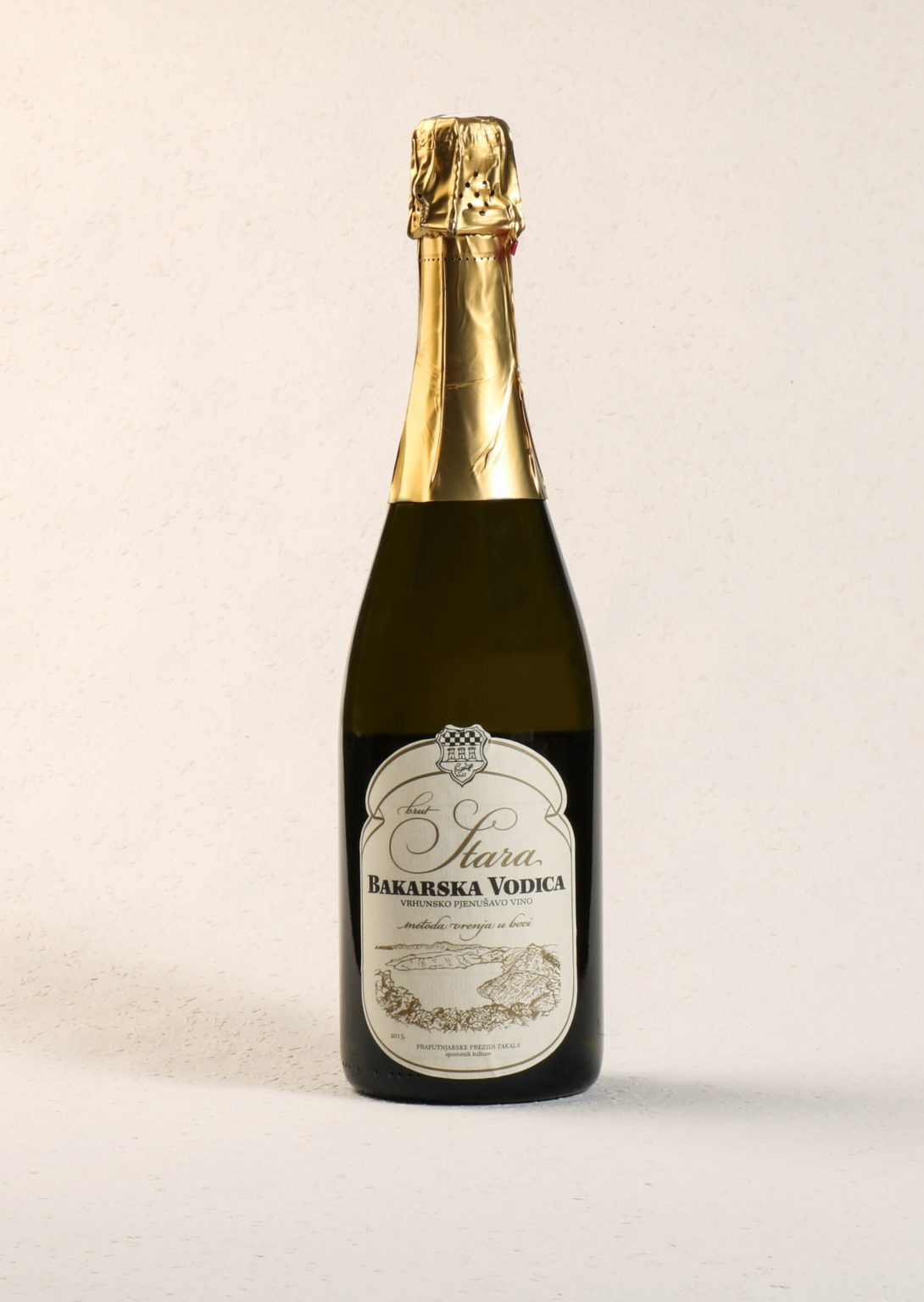 Stara Bakarska Vodica / Kašetica
Stara Bakarska Vodica / Kašetica
Fueled by unrelenting enthusiasm, the project marches on. It was made part of the Rijeka 2020 - European Capital of Culture programme as an initiative entitled Praputnjak - Cultural Landscape.
Together with the Dolčina association and the Dragodid project dedicated to preservation of dry stone masonry, the Praputnjak crew organise wall restoration workshops, with eager volunteers gathering to help rebuild the dry stone terraces. It’s all done by hand, as mechanisation isn’t an option given the specific terrain.
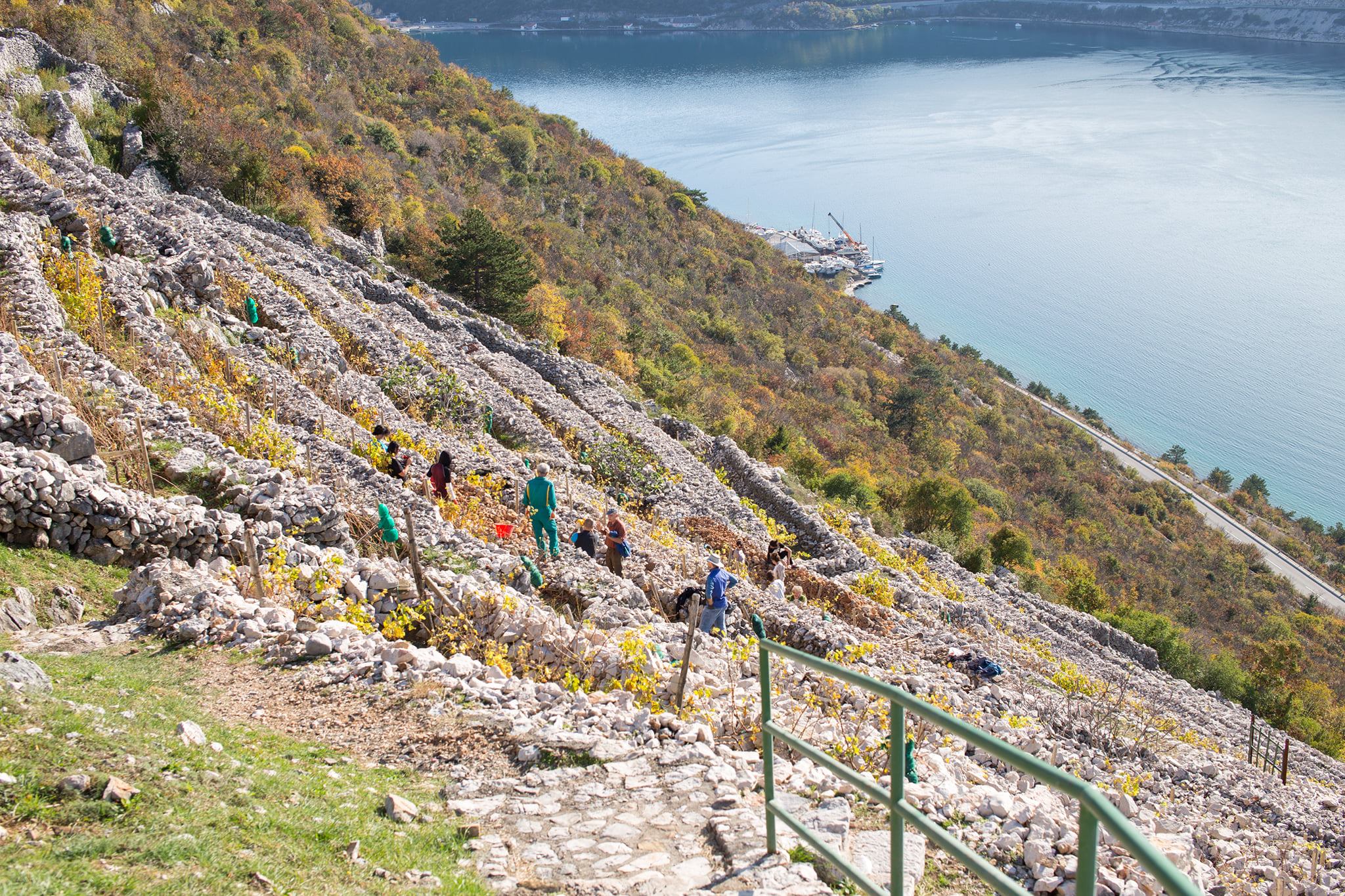 Praputnjak - kulturni krajolik Facebook
Praputnjak - kulturni krajolik Facebook
Nowadays, the Takala vineyard yields some 1,000 bottles of sparkling wine per year. There are no plans for mass production and the wine is not meant to become commercially viable; it’s purely an effort to rekindle the old tradition and save the heritage of the Bakar area.
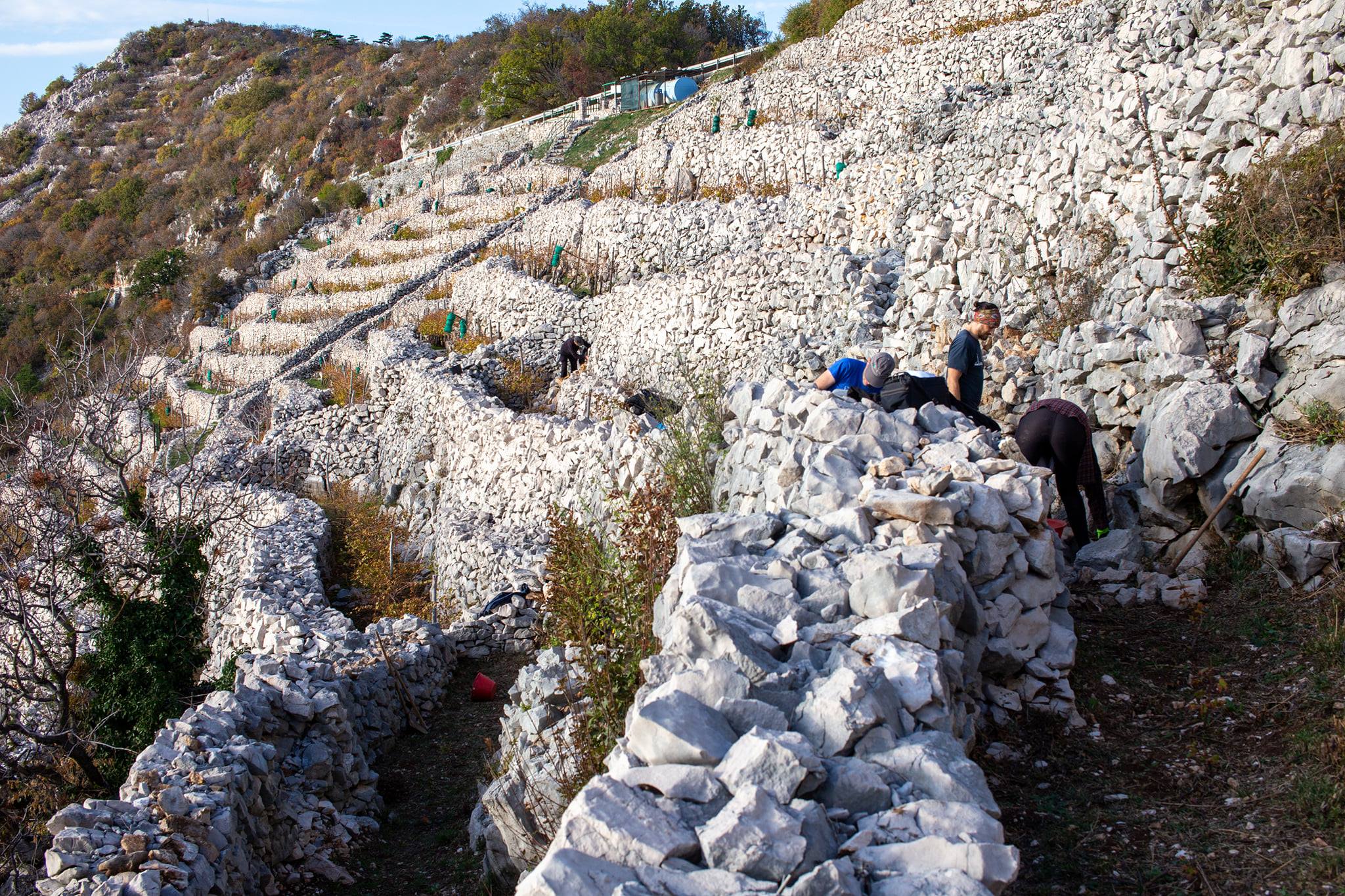 Praputnjak - kulturni krajolik Facebook
Praputnjak - kulturni krajolik Facebook
With Bakar eager to shed its industrial image, efforts are being made to restore the charming town to its former glory. There’s been a noticeable shift towards tourism in recent years; significant investments are being made in public infrastructure, the historic Hotel Jadran is reopening later this year as a four-star facility, and tourism professionals are developing new attractive ways to showcase the vibrant heritage of Bakar. The iconic sparkling wine, together with the spectacular stone vineyards, is just the cherry on top.
Quotes featured in the article were translated from a feature on the dry stone walls of Bakar written by Vjekoslav Tićak and published in Sušačka Revija.
Milanović Talks with Chile President-Elect Boric
ZAGREB, 4 March (2022) - Croatian President Zoran Milanović on Friday spoke on the phone with Chile's President-elect Gabriel Boric on the centuries-old ties between the two countries and accepted Boric's invitation for a visit, Milanović's office said in a press release.
Milanović once again congratulated Boric on the election victory and regretted that he will not be able to attend the March 11 inauguration.
The two said the Croatian community plays an important role in the social and the political life of Chile. Thanks to that community, Croatia and Chile have had centuries-old close ties, they added.
Milanović and Boric exchanged views on the current situation in the world, with emphasis on the crisis in Europe.
For more, check out our politics section.
Croatia Reports 1,351 New Coronavirus Cases, 27 Deaths
ZAGREB, 4 March (2022) - In the last 24 hours 1,351 coronavirus cases, out of 5,124 tests, and 27 related deaths have been registered in Croatia, the national COVID-19 crisis management team said on Friday.
There are 10,879 active cases, including 1,053 hospitalised patients, of whom 14 on ventilators, while 7,459 persons are self-isolating.
Croatia has registered 1,061,429 coronavirus cases to date and the death toll stands at 15,172.
To date, 56.86% of the total population or 67.63% of adults have been vaccinated, including 65.54% of adults fully.
For more news about Croatia, click here.
Vukovar Ready to Take in Refugees from Ukraine
ZAGREB, 4 March (2022) - Vukovar City authorities are doing all they can to help the endangered people of Ukraine who are trying to save their lives from the dangers of war, the Vukovar mayor's office said on Friday.
A statement to the press after Mayor Ivan Penava met with the representative of the Ukrainian ethnic minority in Vukovar-Srijem County, Tetyana Kochnyeva, recalls that the city sent an initiative to the government and Ministry of Physical Planning, Construction and State Assets regarding the possible accommodation of Ukrainian refugees at the Zagreb Hostel in the suburb of Borovo Naselje in Vukovar.
This week, Mayor Penava met with representatives of emergency services, Vukovar's civil protection organisation, the firefighting station, the city's Red Cross branch and the police and talked about providing aid to Ukrainian refugees.
According to Kochnyeva, Ukrainian refugees who have come to Slavonia so far are mostly accommodated in Osijek.
"However, quite a few want to come to Vukovar and that is why we asked Mayor Penava for his help. The situation is changing by the hour and we are working with City of Vukovar to secure accommodation for refugees from Ukraine," said Kochnyeva.
The city appealed to anyone who can provide accommodation or transport from the Ukrainian border to Croatia to contact the the local civil protection at: This email address is being protected from spambots. You need JavaScript enabled to view it. or by calling +385 (0)99/529-50-40.
For more, check out our politics section.
Beroš Says Health Ministry is Procuring Necessary Quantities of Iodine
ZAGREB, 4 Mar (2022) - Health Minister Vili Beroš said on Friday that sufficient quantities of iodine tablets were being procured but that they would only be distributed in case of need, and he again called on citizens not to take them on their own initiative in fear of radiation because they have dangerous side effects.
"They are high doses of iodine which have a number of dangerous side effects - ranging from allergic rashes, gastrointestinal disorders, salivary gland infections, to thyroid failure," Beroš warned in a statement to the press, commenting on the increased interest in iodine tablets following the fire in Ukraine's largest nuclear power plant.
The Ministry of Health, said Beroš, has been in talks for days with manufacturers on the procurement of sufficient quantities of iodine tablets, and domestic galenic laboratories can also produce significant quantities. Iodine tablets will be handed out if necessary, but there will not be any preventive distribution because it has been estimated that some people would take them on their own initiative. One dose with two tablets costs about HRK 8, and the shelf life is five years so stocks are regularly renewed.
Their protection lasts for a maximum of 24 hours, Beroš pointed out, adding that they have to be taken just a few hours following the incident and that they only protect from radioactive iodine and not from other radioactive isotopes.
To use iodine, he said, it is necessary to have information on the amount and type of radiation, as well as meteorological data, and the services for protection against radioactive and nuclear radiation monitor those parameters on a daily basis.
Only in accordance with these data will the distribution of iodine be organised, through civil protection services, the minister said after visiting the motel Plitvice, a reception centre for refugees from Ukraine.
For more, check out our politics section.
Zagreb Stock Exchange Indices Slump at End of Week
ZAGREB, 4 March (2022) - The main Zagreb Stock Exchange (ZSE) indices slumped again on Friday, after yesterday's brief recovery, thus increasing the loss on the week to about 4.5%, which is a consequence of the pressure of the Ukrainian crisis on the world stock market, as well as the domestic one.
The Crobex fell by 1.94% on Friday, to 1,946 points, its lowest level since August 2021. At the same time, the Crobex10 dropped by 1.86% to 1,176 points, its lowest level since April 2021.
All sector indices went down, and the construction index saw the biggest decline, of 2.87%.
Domestic indices thus followed the negative trends on European stock markets, which saw sharp declines, while investors follow the news on the war in Ukraine and assess the possible effects of that war on the world economy.
The Crobex indices also registered significant losses on the week for the third consecutive week. Compared with the beginning of the week, the Crobex fell by 4.69% and the Crobex10 by 4.5%.
Regular turnover amounted to HRK 14 million, or half a million less than on Thursday. Another HRK 23 million was generated by a block transaction with the HT telecom stock at HRK 184 per share.
The highest turnover, of nearly HRK 1.8 million, was generated by the stock of the Croatian Postal Bank (HPB). Its prices dropped by 2.37% to HRK 825.
Atlantska Plovidba turned over HRK 1.41 million, closing at HRK 412 per share, down 2.83%.
The stock of the Span IT company turned over HRK 1.4 million, closing at HRK 185.5, down 0.8%.
The price of the Ericsson Nikola Tesla stock also recorded a significant decline, by 3.7% to HRK 1,705 per share. It generated a turnover of HRK 1.26 million.
A total of 45 stocks traded on the ZSE today, with 10 gaining and 23 losing in price, while 12 were stable.
(€1 = HRK 7.568685)
For more, check out our business section.
Bosniak Leader Says Croat Side Unwilling to Reach Agreement on Election Law Reform
ZAGREB, 4 March (2022) - The leader of the Bosniak Party of Democratic Action (SDA), Bakir Izetbegović, said on Thursday that the agreement on changes to Bosnia and Herzegovina's election law would be reached when the Croat side was ready.
The neighbouring country is set to hold elections in autumn, and there is still no agreement on the new election law and limited constitutional changes.
Speaking in an interview with Croatia's Nova TV, Izetbegović said that Bosniaks were ready for agreement.
"(The agreement will be possible) when the Croat side is ready. We are... I supported the current negotiating model (with EU and US mediators)... even though it is stupid and does not benefit my party while (Bosnian Croat leader Dragan) Čović refused it," said Izetbegović.
"(The prerequisite) is readiness to accept the model offered by the international community, which definitely is not against Čović and Croats, and (the Croats') readiness to unblock the BiH Federation entity. The HDZ has practically blocked the Federation," he said in reference to the Bosniak-Croat entity of Bosnia and Herzegovina.
On Russian invasion
Commenting on Russia's invasion of Ukraine, Izetbegović said that Bosnia and Herzegovina should follow the EU's foreign policy. The Serb member of BiH's collective presidency, Milorad Dodik, does not agree with that and has said that he will not join in sanctions against Russia.
"Everybody has the right to their own opinion, but they do not have the right to be angry and make problems," said Izetbegović, noting that "many things Dodik does are not normal."
"This is the culmination of his actions of the past 15 years that have cost BiH and Republika Srpska and all peoples and citizens dearly," the Bosniak leader said.
"We could have been in NATO by now, we could have made progress on the path to the EU," he said.
As a precaution, and considering the conflicts in the east of Europe, EUFOR will deploy 500 troops in BiH, the EU military mission in BiH said on Thursday.
The worsened international security situation has potential to spread instability to Bosnia and Herzegovina, the mission said.
Asked if he believed there could be an armed conflict in BiH, Izetbegović said that he will do everything he can to prevent it.
For more, check out our politics section.
Non Government Organization Publishes Report on Expulsions of Migrants During COVID-19 Pandemic
ZAGREB, 4 March (2022) - The GONG nongovernmental organisation on Friday opened a three-day online conference "Open data against infodemic" on the occasion of the 9th Open Data Day, to promote the importance of publicly available, open data which the NGO describes as a valuable social resource.
GONG executive director Oriana Ivković Novokmet said the conference would include three panel discussions, one of which would focus on the coronavirus infection and disinformation during the pandemic.
Experts from the universities of Rijeka, Osijek and Dubrovnik will be discussing how false coronavirus information is spread and who the most influential disinformers are.
The second panel, entitled "Data only for the rich," deals with the availability of spatial data, environmental data and data on public companies.
Ivković Novokmet said the latest amendments to the Right to Access Information Act, seeking to align the law with the EU Open Data Directive, was a step backward in terms of access to information standards because data on public spending would require the proportionality and public interest tests in a whole set of cases. GONG also considers as disputable the fact that public companies that make their income on the market, like FINA or Zagreb Holding, would be able to charge for the use of their data.
The third panel, entitled "Who is paying you," deals with the financing of civil sector organisations, Ivković Novokmet said, recalling a "defamation campaign" against civil society organisations during the 2021 local elections.
The event will also include workshops, as well as a discussion on Croatian, Hungarian and Russian officials' real estate in Croatia and the financing of media by the state and local budgets.
Lana Podgoršek of the Code for Croatia civic hackers' group said the conference would provide an opportunity for citizens to ask about anything regarding open data, public procurement transparency, civic hacking and the group's community projects.
Code for Croatia is an initiative that brings together activists and programmers and everyone else interested in open data and socially useful community projects.
Podgoršek also presented the group's new project, called "Fix it," a portal where citizens can report any damage to public infrastructure.
The "Open data against infodemic" conference can be followed on GONG and Code for Croatia's YouTube channels and on GONG's Facebook account.
For more, check out our politics section.


